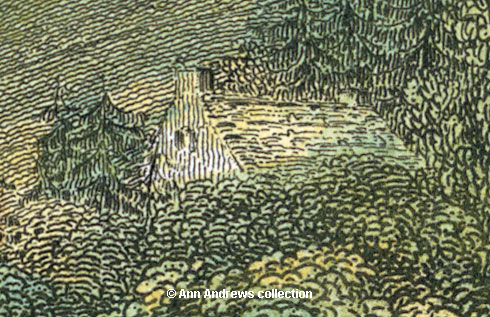|
Images Index> 18th & 19th Century Images> This page |
| Matlock Bath: View of High Tor, by F. Chantrey, 1822 |
| Eighteenth and Nineteenth Century : Photographs, Postcards, Engravings & Etchings |
|
|||
View of Matlock High Tor, Derbyshire. Drawn by F. Chantrey R.A. Engraved by G. Cooke. Published 1st May 1822 by Messrs. Longman & Co. and Messrs. Rodwell and Martin. Proof. |
|||
The large rocks on the river bed have often appeared in photographs and some of them were still there until the river was deepened in the late 1970s/early80s(?). They are the remains of the weir and island for the water wheel which was situated on the east side of the river. According to David Palmer Pearson (1858-1932[1]), this patch of fishing was known as Collingwood's Stream and, some years after the wheel ceased operation, the majority of the stone was removed and used to build Alpine Cottage in Matlock Bath[2]. Phoebe Bown "lived nearly opposite to the High Tor
at Matlock" for a good part of her life and the cottage
amongst the trees on the right, shown in the enlargement
below, fits that description; we also know that her father
Samuel had owned land here which was passed down to Phoebe
by Will[3].
This property would have been Phoebe's home, where she lived
with her parents until their deaths and continued to live
for a good number of years afterwards. The Land Tax of 1s 4d that
Phoebe paid in 1820 would have been the sum due for this
cottage[4]. Just
few years afterwards the Bown's home was sold and demolished
to make way for Tor
Cottage (later the High Tor Guest House/Hotel), which
is still in the Dale today[5].
Phoebe Bown then moved to Matlock where she remained until
her death.
Further reading: |
|||
"View of Matlock High Tor, Derbyshire" from the collection of and © Ann Andrews. Hand colouring not on the original. It is probably recent. Information researched, written by and © Ann Andrews. Intended for personal use only. |
|||
| References
(coloured links are to transcripts or more information elsewhere
on this web site):
[1] Palmer Person was a well-known
Derbyshire antiquararian. He was member of the English Place-Names
Society, and was one of the leading authorities on Derbyshire
place-names. He lived at Heath
Bank and later at Hilderstone. |












 Chantrey's drawing, without
the added colour, can be found
Chantrey's drawing, without
the added colour, can be found